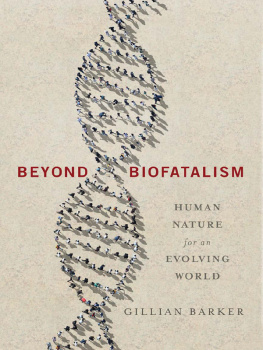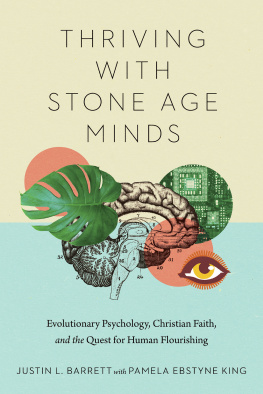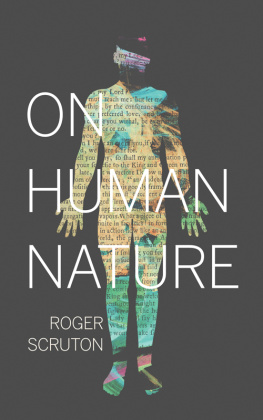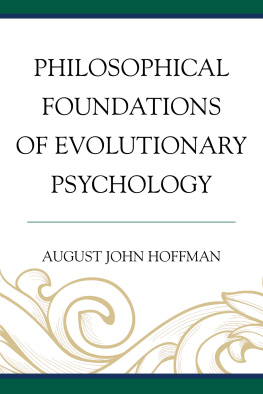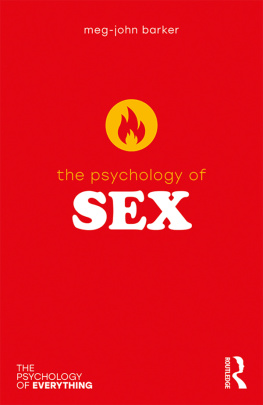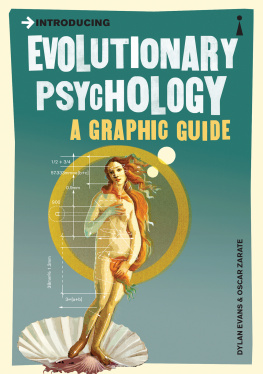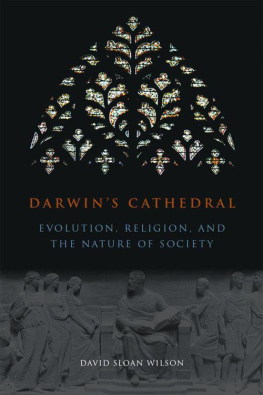Beyond Biofatalism
Beyond Biofatalism
HUMAN NATURE FOR AN EVOLVING WORLD
Gillian Barker
Columbia University Press
New York
Columbia University Press
Publishers Since 1893
New York Chichester, West Sussex
cup.columbia.edu
Copyright 2015 Columbia University Press
All rights reserved
E-ISBN 978-0-231-54039-1
Library of Congress Cataloging-in-Publication Data
Barker, Gillian.
Beyond biofatalism : human nature for an evolving world / Gillian Barker.
pages cm
Includes bibliographical references and index.
ISBN 978-0-231-17188-5 (cloth : alk. paper) ISBN 978-0-231-54039-1 (ebook)
1. Evolutionary psychology. 2. Human evolution. 3. Behavior evolution. 4. Social evolution. I. Title.
BF698.95.B355 2015
155.7dc23
2015012299
A Columbia University Press E-book.
CUP would be pleased to hear about your reading experience with this e-book at .
COVER IMAGE: Getty Images / Hiroshi Watanabe
COVER DESIGN: Diane Luger
References to websites (URLs) were accurate at the time of writing. Neither the author nor Columbia University Press is responsible for URLs that may have expired or changed since the manuscript was prepared.
To the memory of Roger and Louise Barker
Humane scientists, beloved teachers,
practical thinkers, quiet revolutionaries
Contents
I HAVE WATCHED WITH HOPEFUL FASCINATION the growing interest of social scientists and a larger public in applying evolutionary thinking to human behavior. Our need to understand the roots of human choices and social patterns has never been more pressing. Climate science, ecology, and the other sciences that examine human impacts on the Earthand on its capacity to sustain ushave demonstrated that the course that the human species is now traveling is a disastrous one. Indeed, I believe that they show that human survival, especially peaceful survival with a good quality of life, requires some fundamental changes in our patterns of behavior starting as soon as possible. But just what changes are the best ones to pursue, and what are the most effective means for bringing them about? These are ancient and difficult questions, but new tools might help to resolve them. The evolutionary approach has been impressively successful in expanding our grasp in many areas of the life sciences, including medicine and the behavior of other animals, and I have dared to anticipate that evolutionary thinking would open a new avenue to a clearer understanding of how we might begin to make the needed changes. I have been encouraged in this hopeful thought by the energetic entry of first-class evolutionary thinkers like Steven Pinker, David Buss, and Robert Wright into the task of pulling the quite complex and detailed relevant research and analysis together into an overall interpretation of the main implications of human evolutionary history.
I delved into the resulting works of synthesis with increasing dismay. Though they are rich with illuminating insights and intriguing empirical results, the overall interpretations that they offer seemed to converge on all-too-familiar motifs of gender differences and tendencies toward aggression, intolerance, and social competitionconclusions that do not square with my own reading of the basic research and my own reasoning about it. The picture that they present is pessimistic, suggesting that human nature is inexible enough that substantial change to our social arrangements and patterns of behavior may be out of the question, whereas I see grounds for optimism in many of the same sources. Additional research from related areas of biology, psychology, and philosophy, including some that has been published since the major works of synthesis were written, reinforce my sense that the picture these works present is misleading.
The evolutionary approach to understanding human behavior has been controversial from its inception, and many critical studies of human sociobiology and evolutionary psychology have been published. But these focus for the most part on challenging the approach as a whole. My concern is differentI believe that the evolutionary study of human behavior and society has a vital contribution to make, but its leading thinkers have overlooked some of its key lessons. The missing elements are needed not for what Pinker has called dubious moral uplifta feel-good story about human naturebut to guide us in making effective political and practical choices as we confront the stiff challenges of the twenty-first century. I decided that I needed to investigate carefully how the leading synthesizers supported their claims and re-examine their picture of human nature and human social possibilities, developing a new synthesis that takes account of the most recent research and thinking. The result of my efforts is contained in the pages that follow.
This work was undertaken at the Rotman Institute of Philosophy at the University of Western Ontario, a unique center for research at the intersection of philosophy and the sciences. I am deeply grateful for the Rotman Institutes support for this research, and for the stimulating discussions and thoughtful feed-back provided by many of my colleagues and students at Western and elsewhere. I especially thank Philip Kitcher, Nicholas Thompson, Bruce Glymour, Stephen Crowley, ONeal Buchanan, Boyana Peric, and Graham Bracken, as well as three anonymous reviewers, for insightful comments. Patrick Fitzgerald of Columbia University Press has been the most helpful and enthusiastic editor an author could hope for, and Jonathan Barkers wise advice has improved every page. Any errors that remain are mine alone. Thanks finally, and always, to Dave Pearson for unagging support and for persistent good humor and good sense.
WHAT KINDS OF SOCIETY are possible for human beings? What changes to our current social arrangements are feasible, and how can they be achieved? These are old questions, but they have recently taken on a new urgency. It has become plain that substantial social change of some kind will inevitably occur over the next few human generations, driven by new conditions of population density, resource scarcity, and climate changeconditions that are themselves in turn strongly inuenced by what humans do and how we interact with one another. We face imminent and consequential choices about which social changes to pursue and which to resist, and by what means. At the same time, optimism about social change has been fading. Many commentators have noted that the utopian political and social movements of the twentieth century failed to achieve their lofty goalssome led instead to terrible new forms of oppressionand that even in the most enlightened societies many social problems persist despite public policies designed to counter them. These thinkers sometimes go on to draw a broader conclusion: that the possibilities open to human societies are much more limited than would-be reformers had assumed. But this lesson is too vague to be useful. To respond effectively to coming challenges and present problems, we need to understand the possibilities open to us: the particular constraints that limit our options and the pathways by which particular changes might be achieved.
Some of the more forceful recent discussions of the scope of human possibilities have been informed by ideas from evolutionary psychology, taken in the broad sense: evolutionary studies of human cognition and social behavior, what some proponents call the new science of human nature. This label links evolutionary psychology to the long tradition that takes a conception of human nature as a crucial measure of what arrangements of human society could and should be pursued. A well-known version of this kind of reasoning is found in philosophical debates in the seventeenth and eighteenth centuries about the state of nature. Is it (as Jean-Jacques Rousseau argued) peaceful, communal, and egalitarian but capable of corruption by ill-advised innovation? Or is it (as Thomas Hobbes had asserted a century earlier) a state of war, all against all, that only an overarching central power can hold in check? Philosophers no longer appeal to the state of nature, but some evolutionary psychologists argue that evolved human nature sets limits on what is possible for human individuals and for human societieslimits that scientists can discover and specify.

